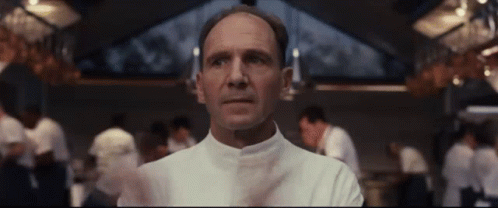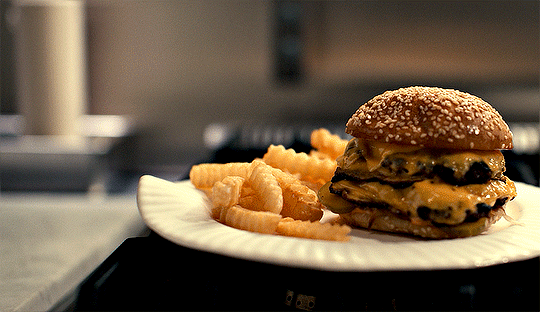The Menu (2022)
Warning, spoilers!
I recently watched the Menu, directed by Mark Mylod. I have never written a review for a film before, so bear with me if I haven’t used quite the right format for this sort of thing.
We've all read stories about fine dining experiences that go a bit too far. Three course meals, each consisting of one mouthful of food, leaving guests starving and short a hundred quid. The Michelin-starred restaurant that serves citrus foam which guests have to lick from a plaster mould of the chef's mouth. The Menu takes this feeling of ridiculousness and elevates it, mocking not just the chefs who would offer such food, but also guests who take it seriously.
I went into the film knowing there was a twist and fully expecting that the twist would be that they were all cannibals eating either previous guests or the staff. I don't think it's too much of a stretch to say I was half right; the phrase 'eat the rich' feels appropriate.
The film starts with a group of elite clientele being led onto an island for a culinary extravaganza the likes of which they have never experienced before. They are given ever more elaborate courses, accompanied by monologues from the Head Chef, Chef Slowik, which become increasingly unsettling. As the dinner progresses, it becomes clear that the guest list, like the menu, has been carefully selected, and each person present has in some way caused the Chef to lose his passion for cooking, and to lose hope in the legitimacy of the artist. It is revealed that Chef Slowik intends for everyone to die at the end, committing their unfulfilled lives to the execution of a final, perfect meal. The Chef however hadn’t accounted for Margot, a last-minute stand-in for another guest, who throws a spanner in the works of his carefully laid plans.
There were lots of sub-themes and messages
going on. Work sustainably with the environment that sustains you; respect the
artist; karma's a bitch. The main object of this film is about recognising the
worth of what is given to you to the maximum, and this covers everything from not
abusing the staff who serve you to living life to its absolute full. This might sound
almost trite, but it's explored in such a nuanced, satirical way that it's hard
not to feel it hit home. On the furthest extreme, the film emphasises the keen
divide between the serving staff (the ‘givers’, as Chef Slowik calls them) and
the wealthy guests who look down on them (the ‘takers’). On the other, when a
sous chef admits he would not be able to endure Chef Slowik's harsh way of
life, even if it meant he could achieve greatness, the Chef tells him to
shoot himself. He does. It's all part of the performance, but it's still part
of the message. He is unable to commit fully to greatness, even when it is offered
and within reach. He has failed to take full advantage of the opportunity he has been given.

The film to me is about appreciation, or the lack thereof. There are the Wall Street bros sharing a table and talking stocks who have embezzled money, failing to appreciate their wealth (and girlfriends). The old married couple who have visited the island and its restaurant for years and are blind to the delights being served to them because it's no longer a once in a lifetime experience. The food critic so taken with her own clever rhetoric that she no longer sees the people creating the food, only what's on her plate, without thought for how her reviews have tanked careers. The has-been actor who has no appreciation for his craft and prostitutes himself in hammy chickflicks; this includes Calling Dr Sunshine, which Chef Slowik laments he watched on his one day off and regretted the waste of time. There's the actor's personal assistant, who seems content in her futureless career with him despite having been given a full ride to an Ivy League education. Which, incidentally, led to one of my favourite exchanges in the film:
CHEF SLOWIK
(to Felicity)
What school did you go to?
FELICITY
Um, Brown?
CHEF SLOWIK
Student loans?
FELICITY
No...
CHEF SLOWIK
Sorry. You’re dying.
And of course there's Margot's date Tyler, the
obnoxious food zealot who talks a big talk, showing off his theoretical
knowledge gleaned from cookery programmes and podcasts; Chef Slowik drops him
in the real kitchen, demands that he cook something for them all, and he
promptly shows he has no practical knowledge whatsoever, even when it comes to
cutting a shallot. He has failed to appreciate the artist, the skill, the
lifetime of learning, assuming a dictionary of terms in his head is enough.
The Chef is, ironically, the worst example of
this failure to appreciate. He is fully aware of it, and indeed it's why he is
pulling off such a charade. He's the star in his own theatre. He has failed his
own staff, sexually harassing coworkers, he has let his craft be dictated by
restaurant owners, he has let his own life - once not unbearable, once (if the
photographs in his bedroom are anything to go by) with a loving wife and child
- become hard, unpleasant and lonely in the pursuit of excellent cuisine. But
even so, there is another level to it, an extra layer of hypocrisy. In the
finale, Margot calls him out, accusing him of failing to love cooking – despite
all he has endured for his craft, and despite his monotone shouts of 'I
love you' to his staff - so caught up in the avant-garde character of his food
that he has forgotten that food is supposed to be enjoyable, and tasty. He
himself laments that he hasn't cooked to please anyone in a long time. As the
Chef cooks her a double cheese-burger with crinkle fries, you can see the
simple pleasure he derives from it, and from watching her take a giant
mouthful. The Chef lets her go, and smilingly, peacefully, sets himself, the staff and the
remaining guests on fire in a rendition of smores. Perversely, Margot has
helped to create that perfect final meal Chef Slowik wished for by making him
appreciate his art one last time.
There were little moments of storytelling throughout that I really loved, little poignant indicators of character. Like when Margot has managed to outwit the chef and has a foot out the door, but glances back in a moment of guilt to survey the other guests she's abandoning. One of the guests gives a barely perceptible wave of her hand, indicating she needs to go, that it's alright.
Sometimes this didn't always work, and the film perhaps tried to be too clever. When the 'coastguard' appears and everyone thinks they're saved, the coastguard sees the former actor and asks for his autograph, saying how much he enjoyed his performance in Calling Dr Sunshine. At first I thought it was feeding into the idea of how daft or simple things can be enjoyable and therefore still worthwhile, a foreshadowing of the burger, undermining the Chef's pompous disregard for anything that isn't serious art. This faltered somewhat when it turned out that the coastguard was just one of the sous chefs in disguise, sent to rattle them all and give them a false sense of hope; it then sounded like something Chef Slowik had told him to say, which didn't ring true. If it had come up earlier, perhaps in an exchange between the guests before the meal became fraught, it would have had more impact on a second watch-through. It doesn’t make a lot of sense coming from someone who’s a plant. But I’m nit-picking, and I fully expect I've just missed a nuance.
The performances from the three leads were of course amazing. I will watch Ralph Fiennes in anything; he has a way of bringing something subversive, a little perverted, to a role. Nicholas Hoult made me really hate his character, so job well done I guess! A perfect blend of sychophant and pompous ass. Anya Taylor-Joy was, as usual, fantastic, bringing a sense of Other to the character; she's not on the serving staff but also not one of the wealthy diners, a bridging character.
There's a lot to analyse in this film, and I
feel like I've only tugged on a few of the strings, when there is really much
more to say. I haven't felt the urge to unpick a film like this in a long time,
and I feel like I'll need to watch it again to appreciate it fully. To make a forced analogy, I found the
writing delicious, the storytelling masterfully rich, the satire a cherry on top.

This review really made me reflect on how satire can expose uncomfortable truths about privilege and artistic integrity. jcobs
ReplyDelete